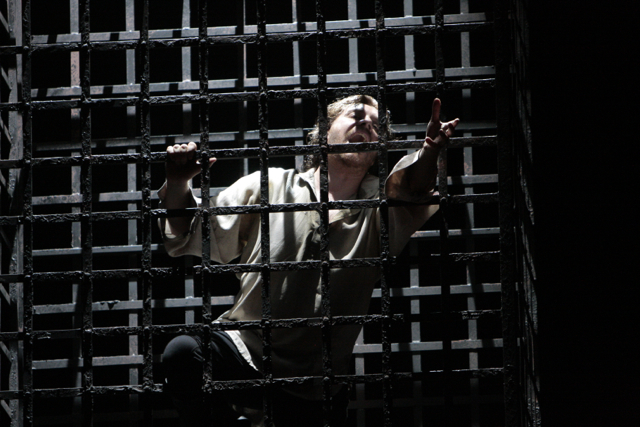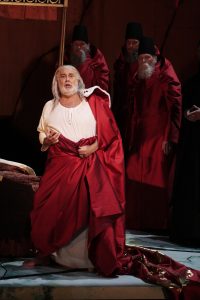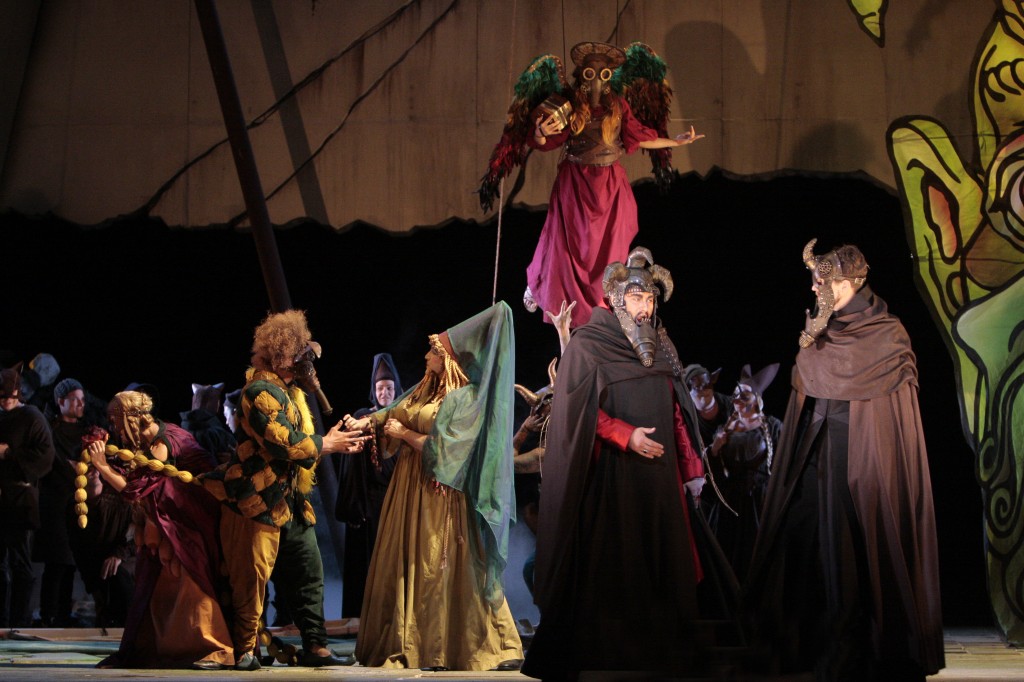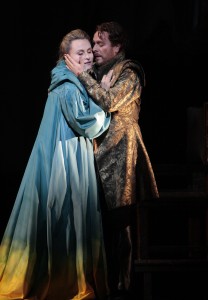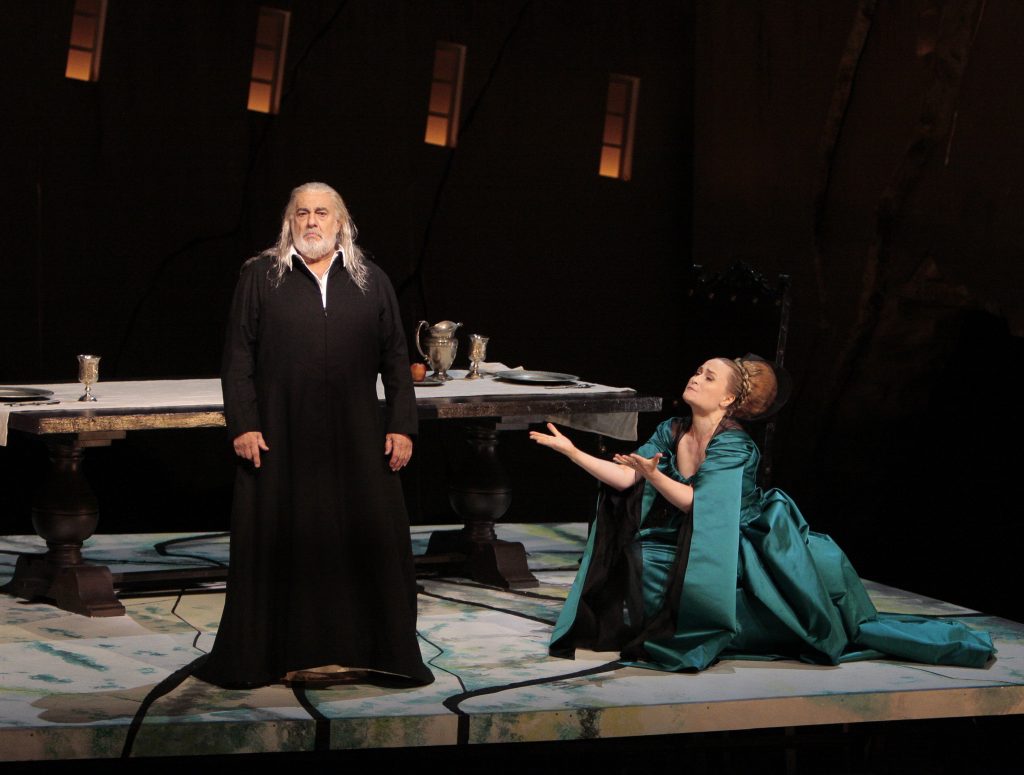Posts by Janos Gereben
Verdi’s little-known “I Due Foscari” displays remarkable vitality in LA
Los Angeles Opera
Verdi’s I Due Foscari (“The Two Foscari”)
Review by David Gregson, Monday, September 17.
Did you know that Verdi’s I Due Foscari (“The Two Foscari”) is the greatest opera Verdi ever wrote?
Well, if you believe it is so, you can make it so — which seems to be the attitude of conductor James Conlon along with everyone else involved with the Los Angeles Opera’s gala season opener Saturday evening at the Dorothy Chandler Pavilion.
Conlon flung himself into this early Verdi piece with a thrilling ferocity that made the whole experience dramatically tense as well as an utter delight. The La Opera Chorus (choral director Grant Gershon’s crack platoon) and the LA Opera orchestra (sounding galvanized into action) and a roster of superb soloists gave this musty rarity all the respect in the world and jolted it into vibrant life. Early Verdi’s show-off style is great fun, and that great composer never seemed to be at a loss for a good tune. The drama is less convoluted than usual for early Verdi (although it’s quite confusing enough), and if an opera company gives it a great, thoroughly committed performance like this one — well, the audience is going to love it, which they did.
It would be wonderful, by the way, if we heard more of Verdi’s early works and his less performed later works, and perhaps we will — somewhere else in the world — during this upcoming 2013 centennial celebration of his birth. But Wagner’s birthday centennial coincides, complicating the issue, and the LA Opera seems to have discharged its Verdi rarity responsibility (if you can call it that) by giving us I Due Foscari, even if it was, in many ways, a slightly cynical vanity project cooked up by Domingo, the LAO’s general director, to show off his chops as a newly converted baritone and to use his name as an audience draw.
I confess to be one of those Domingo admirers that goes to hear his baritone excursions with fear and trepidation, but this is definitely an occasion where the role might have been written just for him — almost as if Verdi had a 71-year-old former tenor in in mind. The Domingo voice is still beautiful, even if it is not the voice of his youth, and he is actually able to channel his age into the drama’s role of a somewhat ineffectual yet venerable Doge of Venice. In his very physical presence complemented by his experienced artistry, Domingo makes a highly sympathetic figure, especially in those famously Verdian scenes where the composer demands highly charged emotional exchanges between father and daughter, and, in this case, between father and son.
The opera’s story, taken from the 1822 play, The Two Foscari: An Historical Tragedy by Lord Byron, is set in Venice circa 1457 and revolves about events in the the troubled reign of the Doge Francesco Foscari (Domingo). Despite staying in power over a period of 34 contentious years and being rather good at his job, he has a rival, Loredano (the beautifully full-toned Ukrainian basso Ievgen Orlov) who has had something to do with Doge Francesco Foscari losing three of his four sons. Only Jacopo Foscari (the wonderfully Italian-sounding as well as actual Italian tenor, Francesco Meli) survives, but he has powerful enemies who manage to cook up tricky schemes to get Jacopo arrested and condemned for crimes against the state. He is caged and tortured. A Venetian senator, Barbarigo (the excellent tenor Ben Bliss) also has a function in all this unpleasantness, although I cannot say with any precision just what it is.
Meanwhile, Jacopo’s wife Lucrezia Contarini (fiery soprano Marina Poplavskaya at her best) frantically and furiously tries to save him. But somehow Jacopo’s own father (and a Doge to boot) is unable to do anything to rescue his son. It would violate a Venetian law for him to act. Much emotional turmoil ensues for an entire act or more. There are four of these acts, by the way, but they go by very quickly despite two long intermissions.
A festival scene alleviates the general gloom of the tale, although none of the jolly irresponsible citizens want to contemplate the old Doge Foscari’s problems. The restive mobs from Verdi’s “Simon Boccanegra” are conspicuously missing. Then, just at the last minute, authentic evidence that would exonerate Jacopo from exile and likely execution materializes. Unfortunately it’s too late. The Doge dies of shock and sorrow but not before Lucrezia gets a wild short scene in which to display emotional and vocal fireworks in the inimitable early Verdian manner. Despite some occasionally very weird sounding tones in quick passages, Poplavskaya was thrilling, and Meli showed that he is most definitely a top tenor we need to hear much more often.
Effectively directed by Thaddeus Strassberger, the opera’s mise en scene is a strange one. Scenic designer Kevin Knight, costume designer Mattie Ullrich, and lighting designer Bruno Poet have given us a weird world which in many ways evokes the art of Salvador Dali — while at the same time not looking in the least bit like that artist’s style. A decaying Venice is propped up by long metal cylinders (recalling Dali’s wooden crooks that often keep his surreal objects from falling down or that prop open flesh wounds). Puzzling utilitarian ramps run right and left both high and low, and the backdrop is an almost abstract blot of darkness. The prison cages, however, seem to quote the work of Piranesi.
I would say this production is a must for all fans of early Verdi in the area. There’s no more early Verdi in the works, not even in Long Beach. San Diego Opera will be doing the late-period not-at-all rare Aida in the upcoming season, and San Francisco has just done the middle period warhorse, Rigoletto — so that’s it. SFO did, however, perform Attila in the summer season just past, a review of which (by Janos Gereben) appears at this site.
CAST
Francesco Foscari: Plácido Domingo
Jacopo Foscari: Francesco Meli*
Lucrezia Contarini: Marina Poplavskaya
Loredano: Ievgen Orlov*
Barbarigo: Ben Bliss+
Pisana: Tracy Cox+
Servant of the Doge: Hunter Phillips+
CREATIVE TEAM
Conductor: James Conlon
Director: Thaddeus Strassberger*
Scenic Designer: Kevin Knight
Costume Designer: Mattie Ullrich*
Lighting Designer: Bruno Poet*
* LA Opera debut artist
+ Domingo-Thornton Young Artist Program member
SCHEDULE
Saturday September 15, 2012 07:30 PM
Thursday September 20, 2012 07:30 PM
Sunday September 23, 2012 02:00 PM
Saturday September 29, 2012 07:30 PM
Sunday October 07, 2012 02:00 PM
Tuesday October 09, 2012 07:30 PM
RUNNING TIME
Two hours and 35 minutes, including two intermissions.
Evening performances: 7:30-10:05 p.m. (approximately)
Matinee performances: 2:00-4:35 p.m. (approximately)

